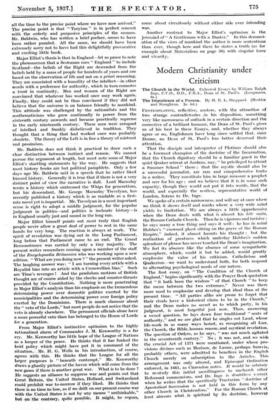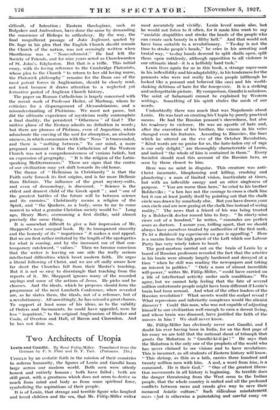Modern Christianity under Criticism
The Church in the World. Collected Essays by William Ralph
CONTEMPLATIVE, reflective, austere, with the attraction of two strange contradictories ,4n his disposition, something very like narrowness of outlook in a certain direction and the corrective of a brilliant humour, the Dean of St. Paul's giveS us of his best in these Essays, and, whether they always agree or no, Englishmen have long since' settled that, since Donne, no Dean of St. Paul's has better deserved their attention.
That the disciple and interpreter of Plotinus shoUld also be a foremost champion of the doctrine of the Incarnation, that the Church dignitary shoUld be a famiiiar gueSt in ' the quiet Quaker retreat at Jordans, nay, " be privileged to attend a _Sumther School " there ; that the mystic should also be a successful journalist, are rare and crimprehensive traits in a writer. They constitute him in large Measure a prophet and seer for his age ; and we believe that it is in some such' capacity, though they would not put it into Words, that the world; and especially the restless, representative world' of London, listens to Dr. Inge.
We spoke of a certain narrowness, and will'say at once where we think it shows itself and marks where a very wide mind yields to limitation. We are always a little apprehensive when the Dean deals with what is almoSt his Me noire, the Roman Catholic Church. Then he is vigorous and incisive ; he says many a true thing and says it well : he has in /bind Hobbes's " crowned ghost sitting on the graVe of the Reiman Empire," indeed, it almost haunts his thought ; but the realization of greatness which underlay Hobbes's sudden splendour of phrase has never touched the Dean's imagination. We feel its absence like the absence of some sympathetic atmosphere, which, could it but be added, would greatly emphasize the value of his criticism. Catholicism and Quakerism—we want to understand both, for both respond to alternating psychological needs of our nature.
The first essay, on " The Condition of the Church Of England," begins significantly with the Prayer Book quotation that " it hath been the wisdom " of that Church " to keep the mean between the two extremes." Never was there more need to emphasize and develop that ideal than at the present time. " All parties alike are prone to forget that their rivals have a historical claim to be in the Church," and the Dean makes no secret as to which party, in his judgment, is most forgetful just now. Then, answering a vexed question, he lays down four traditional " seats of authority," and we are glad that he singles out Laud, whose life-work in so many ways lasted, as recognizing all four, the Church, the Bible, human reason, and mystical revelation. The question of Orders, as he says, " was not much agitated in the seventeenth century." No ; it was not, and we wish the crucial Act of 1571 were mentioned, under whose pro- visions divines such as Morison, de Lamle, perhaps Saravia, probably others, were admitted to benefices in the English Church merely on subscription to the Articles. This arrangement was only altered, and Episcopal Ordination enforced, in 1661, as Clarendon notes. It would be salutary to re-study this initial unwillingness to unchurch other Reformed communions, and Dr. Inge is doubtless c3rrect when be writes that the specifically Tractarian " doctrine of
Apostolical Succession is not held in this form by any other Church in Christendom." For the Roman Church at least stresses what is spiritual by its doctrine,.. however difficult, of Intention ; Eastern theologians, such as Bulgakov and Androutsos, have done the same by demanding the consensus of Bishops to orthodoxy. By the way, the final magnificent passage of John Inglesant, quoted by Dr. Inge in his plea that the English Church should remain the Church of the nation, was not seemingly written when Shorthouse was a " Nonconformist." He had left the Society of Friends, and for nine years acted as Churchwarden of St. John's, Edgbaston. But that is a trifle. This initial essay, with its loving reference to the Cambridge Platonists, whose plea to the Church " to return to her old loving nurse, the Platonick philosophy" remains for the Dean one of the most potent forces in Anglicanism, should be closely read, not least because it draws attention to a neglected yet formative period of Anglican Church history.
The paper on Roman Catholicism is largely concerned with the recent work of Professor Heiler, of- Marburg, whom he criticizes for a disparagement of Alexandrianism, and a misunderstanding of Plotinism. We must not pause, but did the ultimate experience of mysticism really contemplate a final duality, the persistent " Otherness " of God ? The unitive phase of the Ecstasy admits no definition in words ; but there are phrases of Plotinus, even of Augustine, which adumbrate the craving of the soul for absorption, an absolute oneness, in which communion with the " Nous " is transcended, and there is " nothing between." To our mind, a more pregnant comment is that the Catholicism of the Western Church was not a comprehensiveness of various beliefs, but an expression of geography. " It is the religion of the Latin- speaking Mediterraneans." There are signs that the centre of our civilization may yet shift towards its old home.
The theme of " Hellenism in Christianity " is that the Faith early forsook its first origins, and is far more Hellenic than Hebraic. The influence of the great mystery-cults, and even of demonology, is discussed. " Science is the eldest and dearest child of the Greek spirit " ; and " one of the greatest battles of the future will be between science and its enemies." Christianity means a religion of the Spirit, and " the Quakers, as a body, seem to me to come nearest to what a genuine Christian society would be." Long ago, Henry More, overcoming a first dislike, said almost precisely the same thing.
It is somewhat difficult to give a fair impression of Mr. Sheppard's most unequal book. By its transparent sincerity and the honesty of its impatience " it makes a real appeal. But we are first rather irritated by the length of the apologetics for what is coming, and by the incessant use of that con- temporary catchword, " values." Then we become conscious that the writer is leaving on one side the really serious intellectual difficulties which beset modern faith. He urges a literal following of Christ, and we are all sadly aware how far short the Churches fall from their Master's teaching. But it is not so easy to disentangle that teaching from the reports of it. Mr. Sheppard ignores many of the recorded sayings and some of the actions of Jesus. He picks and he chooses. And the ideals, which he proposes should form the programme of the next Lambeth Conference, when revealed are, as he states them, the ideals, not of a reformer, but of a revolutionary. All unwittingly, he has missed a great chance. To support at least some of his ideas, as to the validity of Orders and Sacraments, he could have appealed, were he less " impatient," to the original Anglicanism of Hooker and Cosin, of Overton and Hall, of Bacon and Clarendon. And he has not done so.



















































 Previous page
Previous page